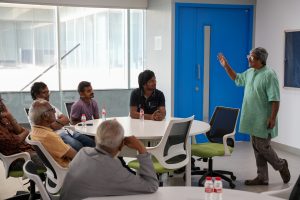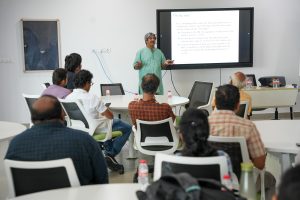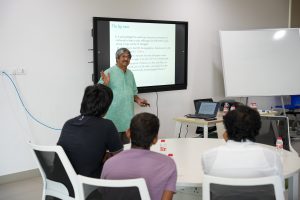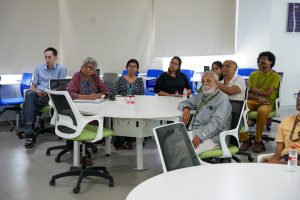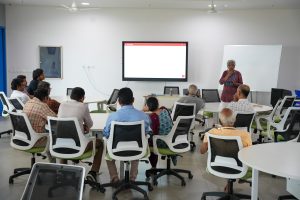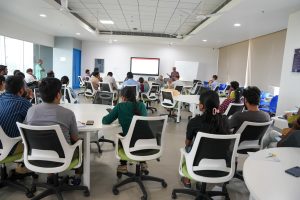Dr Jaidev Kaushik Harnesses the Potential of Waste-Derived Copper Flakes
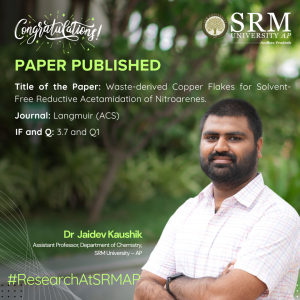 In a society where sustainability is the watchword, Dr Jaidev Kaushik, Assistant Professor at the Department of Chemistry introduces an innovative method for producing acetanilide derivatives, using waste-derived copper flakes as a catalyst. This environmentally friendly approach enables a single-step synthesis while promoting a “waste to wealth” philosophy. His paper titled, “Waste-derived Copper Flakes for Solvent-Free Reductive Acetamidation of Nitroarenes,” featured in the Q1 Journal, Langmuir (ACS).
In a society where sustainability is the watchword, Dr Jaidev Kaushik, Assistant Professor at the Department of Chemistry introduces an innovative method for producing acetanilide derivatives, using waste-derived copper flakes as a catalyst. This environmentally friendly approach enables a single-step synthesis while promoting a “waste to wealth” philosophy. His paper titled, “Waste-derived Copper Flakes for Solvent-Free Reductive Acetamidation of Nitroarenes,” featured in the Q1 Journal, Langmuir (ACS).
Abstract:
Amides are the most vital chemical moieties used in organic and biological processes and as a starting material in many industrial sectors like pharmaceuticals, agro-based, polymers, solvents, dyes, pigments, etc. The most common synthesis method of amides is by first reducing nitroarenes to their corresponding amines, followed by acylation with the required acyl group, a two-step process involving expensive metal catalysts. Given this, we have utilized waste-derived copper (Cu) flakes as a cost-effective heterogeneous catalyst for solvent-free and one-pot reductive acylation of nitroarenes. Metallic zerovalent copper flakes (f-ZCu) were isolated from waste copper Cu scrap/flakes/turnings generated after the grinding and cutting from the Cu industries. Moreover, the same procedure was also utilized to produce various substrates, including the gram-scale synthesis of the well-known crucial antipyretic drug, paracetamol.
Practical / Social Implications:
The proposed copper waste-derived heterogeneous catalyst can replace toxic and heavy metal catalysts from various organic synthesis reactions and can be utilized in the large-scale synthesis of important drugs such as paracetamol under more optimized conditions.
Collaborations:
Dr Sumit Kumar Sonkar (MNIT Jaipur, India)
Future Research Plans:
1. The adsorption/photodegradation-assisted quick and efficient removal of next-generation advanced pollutants such as microplastic, pesticides, pharmaceutical waste, etc. by hydrophobic carbon aerogel and their doped and functionalized versions.
2. Utilising waste-derived heterogeneous catalysts in organic transformation reactions.
3. Selective sensing of toxic metal ions/biomarkers/biomolecules using fluorescent nanomaterials.
4. Upcycling of carbonates/CO2 via photo/thermal assisted reactions to get C1 and C2 hydrocarbons (green fuel).
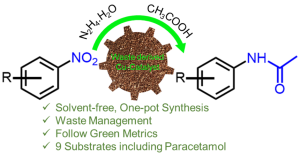
- Published in Departmental News, News, Research News
Prof. R Ramanujam Exploring the Role of Mathematics and Science in Social Inclusion
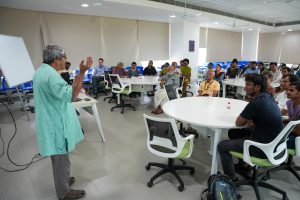 On October 4, 2024, Department of Mathematics at SRM University-AP hosted its 10th Distinguished Lecture, featuring renowned mathematician and educator Prof. R Ramanujam. The event attracted a diverse audience, including BSc and BTech students, PhD candidates, and faculty members, all eager to engage with the critical topic of mathematics and science education for students from socially and economically marginalised backgrounds.
On October 4, 2024, Department of Mathematics at SRM University-AP hosted its 10th Distinguished Lecture, featuring renowned mathematician and educator Prof. R Ramanujam. The event attracted a diverse audience, including BSc and BTech students, PhD candidates, and faculty members, all eager to engage with the critical topic of mathematics and science education for students from socially and economically marginalised backgrounds.
Prof. Ramanujam’s lecture posed a thought-provoking question: “What do mathematics and science education mean to a student from socially and economically marginalised sections?” Drawing from his extensive experience in various educational contexts, he provided valuable insights into the intersection of education and social equity. His work with the Tamil Nadu Science Forum, government curriculum bodies, and teacher education programs at Azim Premji University in Bengaluru informed his perspective on the necessity of aligning educational practices with the realities faced by marginalised communities.
During his talk, Prof. Ramanujam emphasised the importance of conducting educational research that is deeply rooted in social contexts. He argued that curriculum-making decisions should be informed by such research to ensure that education is socially inclusive and responsive to the unique challenges faced by disadvantaged students. His advocacy for an education system that addresses the needs of all learners resonated strongly with the audience, highlighting the potential for education to serve as a transformative force in society.
Prof. R Ramanujam is a distinguished figure in the fields of mathematics and education. He completed his PhD at the Tata Institute of Fundamental Research (TIFR) and pursued postdoctoral work at the City University of New York (CUNY), USA. His long-standing association with the Institute of Mathematical Sciences (IMSc) in Chennai and his current role as a visiting professor at Azim Premji University further underscore his commitment to advancing educational practices.
The lecture provided a stimulating exploration of how mathematics and science education can help address social inequalities. Prof. Ramanujam’s reflections on education, grounded in his experiences with marginalised communities, left a lasting impact on attendees. The event concluded with an engaging Q&A session, where participants raised questions about the challenges of implementing socially rooted educational reforms. This discussion reinforced the lecture’s key themes of inclusivity and the transformative potential of education when designed to meet the diverse needs of learners.
The 10th Distinguished Lecture at SRM University-AP not only highlighted the importance of educational equity but also inspired dialogue on how institutions can better serve all students, particularly those from marginalized backgrounds.
- Published in Departmental News, Math News, News
Environmental Sustainability in Corporate Business Firms of Ghana
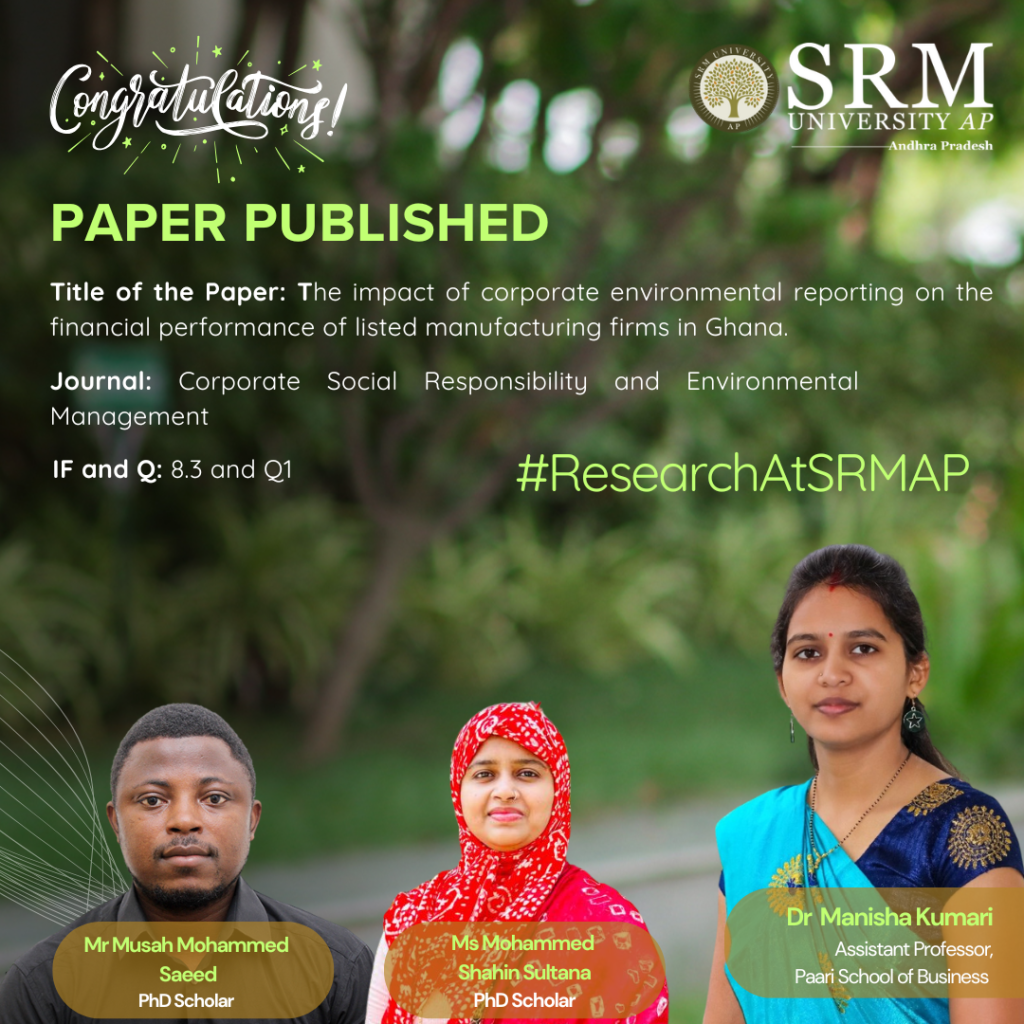
It is pivotal for multinational companies to opt for sustainable growth while expanding their domains. In this regard, Dr Manisha Kumari, Assistant Professor from the Department of Management, Paari School of Business, has published her paper titled “The Impact of Corporate Environmental Reporting on the Financial Performance of Listed Manufacturing in Ghana” along with her research scholars Mr Musah Mohammed Saeed and Ms Mohammed Shahin Sultana in the Q1 journal Corporate Social Responsibility and Environmental Management with the impact factor 8.3.
Abstract
A growing number of businesses are facing criticism for engaging in environmentally damaging practices. Despite advancements in technology and operational efficiency, the environmental challenges confronting businesses have become increasingly urgent. As disclosure requirements have expanded, the importance of reporting standards for environmental sustainability has risen. This study explores the impact of corporate environmental reporting on the financial performance of listed manufacturing firms in Ghana. It analyses ten years (2012-2021) of annual reports from 20 publicly traded manufacturing companies, using panel regression and content analysis to assess the data. The findings reveal that environmental sustainability disclosure (ENVD) has a positive and significant effect on return on equity (ROE) and net profit margin (NPM). Furthermore, disclosures related to health, safety, and community development initiatives have a strong positive impact on ROE. The study recommends that policymakers develop guidelines, especially for environmental reporting, to aid firms in preparing their annual reports. It also suggests that corporate accountants expand their expertise and collaborate with environmental and ecological experts. This research offers valuable insights for policymakers and provides a foundation for further investigation into the effects of corporate environmental reporting (CER) on the performance of listed firms in sub-Saharan Africa.
Explanation of the Research in Layperson’s Terms
In simple terms, this study looks at how companies are being criticised for harming the environment, even though they have access to better technology and more efficient ways of working. Environmental problems for businesses are getting more serious, and as governments and organisations require companies to share more information about how they affect the environment, the standards for reporting this information have become more important.
The research focuses on how reporting environmental activities affects the financial success of manufacturing companies in Ghana. It examines reports from 20 publicly traded companies over ten years (2012-2021). The analysis shows that companies that disclose their environmental efforts, such as how they manage health, safety, and community projects, tend to have better financial outcomes, particularly in terms of the profit they return to shareholders and how much profit they make overall.
The study recommends that governments create clear guidelines for environmental reporting to help companies include this information in their annual reports. It also suggests that accountants should work more closely with environmental experts to improve their knowledge. The research provides important information for policymakers and encourages further exploration into how reporting on environmental activities affects company performance in Africa.
Practical Implementation/Social Implications of the Research
The study shows that environmental sustainability disclosures (ENVD) positively impact net profit margin (NPM) and return on equity (ROE) but have minimal effect on return on assets (ROA). This emphasises the need for stricter regulations to ensure comprehensive sustainability reporting, with policymakers incentivising better practices to boost financial performance.
- Energy disclosure (END) positively affects NPM, ROA, and ROE, suggesting mandatory energy-efficiency reporting. Regulators should set standardised metrics and offer tax incentives to encourage energy-efficient technologies.
- Mandatory environmental reporting by companies can help achieve environmental goals, gain importance in securing trade partnerships, and attract global capital.
- Health and safety disclosures (HSD) improve financial metrics, underscoring the need for stricter workplace safety regulations and rewarding safety-focused companies to enhance both worker safety and financial outcomes.
- Community involvement disclosure (CID), which has a negative but insignificant effect on financial performance, highlights the need for standardised reporting and alignment with core business strategies to show long-term value.
- To boost transparency, integrated reporting should be adopted nationwide, embedding environmental and social disclosures into financial reports to better demonstrate their long-term impact. Strengthening Ghana’s weak regulatory framework and aligning it with international standards (e.g., IFRS S1 and S2) would improve corporate social responsibility (CSR) practices, particularly in community development.
- Fiscal incentives, such as tax breaks, could encourage firms to invest in long-term sustainability projects, such as education and healthcare. Capacity building within firms, including sustainability training, would improve both financial and environmental outcomes.
- Standard method of accounting for environmental reporting can bring consistency in the market. Also, they required a proper set of guidelines that can attract environmental investors.
Overall, policy reforms focused on transparency, regulation, and aligning sustainability with financial goals would significantly benefit Ghana’s corporate sector.
Future Research Plans
Dr Manisha plans to shift her focus from traditional accounting standards to the growing field of sustainability reporting. This transition aligns with the increasing global emphasis on environmental, social, and governance (ESG) issues, which have become central to corporate accountability and transparency. Sustainability reporting has been a topic of ongoing discussion, reflecting the need for businesses to disclose not only their financial performance but also their impact on the planet and society.
- Published in Departmental News, News, Paari Current Happenings, Research News
Pioneering IoT Security: Dr Mohammad Published in Prestigious Q1 Journal
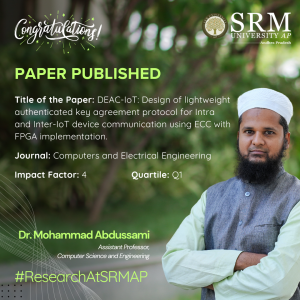 Dr Mohammad Abdussami, an Assistant Professor in the Department of Computer Science and Engineering, has made a significant contribution to the field of Internet of Things (IoT) security with the publication of his paper titled “APDEAC-IoT: Design of Lightweight Authenticated Key Agreement Protocol for Intra and Inter-IoT Device Communication Using ECC with FPGA Implementation.” This groundbreaking research has been published in the esteemed Q1 journal Computers and Electrical Engineering, which boasts an impact factor of 4.
Dr Mohammad Abdussami, an Assistant Professor in the Department of Computer Science and Engineering, has made a significant contribution to the field of Internet of Things (IoT) security with the publication of his paper titled “APDEAC-IoT: Design of Lightweight Authenticated Key Agreement Protocol for Intra and Inter-IoT Device Communication Using ECC with FPGA Implementation.” This groundbreaking research has been published in the esteemed Q1 journal Computers and Electrical Engineering, which boasts an impact factor of 4.
Dr Abdussami’s research addresses critical security challenges faced by IoT devices, particularly in facilitating secure communication between intra and inter-device networks. The lightweight authenticated key agreement protocol he has developed utilizes Elliptic Curve Cryptography (ECC) and Field-Programmable Gate Array (FPGA) implementation to enhance the security framework of IoT ecosystems.
As the adoption of IoT devices continues to expand across various sectors, the importance of robust security protocols cannot be overstated. Dr Abdussami’s work is poised to make a substantial impact on how devices communicate safely and efficiently, ensuring the integrity and confidentiality of data transmitted over the network.
As the demand for secure IoT solutions continues to grow, Dr Abdussami’s research stands as a beacon for future developments in this crucial area, potentially paving the way for safer and more efficient IoT interactions globally.
Abstract:
In this research work, we proposed a fog-enabled network architecture integrated with IoT devices (Intra and Inter-domain IoT devices) and developed the DEAC-IoT scheme using Elliptic Curve Cryptography (ECC) for secure authentication and key agreement. Our protocol is designed to protect device-to-device communication from security threats in resource-constrained IoT environments.
Citation format:
Abdussami Mohammad, Sanjeev Kumar Dwivedi, Taher Al-Shehari, P. Saravanan, Mohammed Kadrie, Taha Alfakih, Hussain Alsalman, and Ruhul Amin. “DEAC-IoT: Design of lightweight authenticated key agreement protocol for Intra and Inter-IoT device communication using ECC with FPGA implementation.” Computers and Electrical Engineering 120 (2024): 109696.
Explanation of the Research in Layperson’s Terms:
With more and more devices connecting wirelessly through the Internet of Things (IoT) (think of smart home gadgets, wearables, etc.), keeping their communications secure has become a big priority. However, many current communication methods for IoT devices don’t provide strong enough security. This leaves them open to cyber-attacks.
The challenge is to create a security system that is safe from attacks and doesn’t require too many computations. This is important because IoT devices often have limited resources (like low battery power or slower processors).
In this research, the authors have devised a solution: a new type of network setup (called fog-enabled architecture) that connects IoT devices with each other and with external devices. They’ve also developed a security protocol called DEAC-IoT, which uses Elliptic Curve Cryptography (ECC)—a highly efficient method for securing communications.
Their system makes it easier for IoT devices to authenticate (verify each other’s identity) and securely exchange keys (used to encrypt data), all while being lightweight enough to run on devices that don’t have a lot of processing power or energy.
In short: the paper offers a way to securely connect IoT devices with minimal computations, making communication between devices safe from hackers, even in environments where cyber threats are common.
Practical Implication and Social Implications Associated:
The practical implementation of this research can strengthen the security of IoT devices across many sectors, from homes and cities to healthcare and industries. The proposed DEAC-IoT scheme can also be used to implement vehicle to vehicle secure communication in autonomous vehicles, VANETs and Internet of Vehicles scenario.
Socially, it can enhance trust in IoT technology, protect privacy, safeguard critical infrastructure, and promote economic and technological development—while ensuring security remains affordable even in resource-constrained environments.
In Industrial IoT (IIoT) Scenario: In industries where machines are connected via IoT (such as in factories), devices need to communicate securely to ensure the smooth running of production lines. The DEAC-IoT protocol could secure these communications, preventing industrial espionage or sabotage.
Future Research Plans
1. Design of group key authentication protocols for IoT devices communication.
2. Design of handover authentication protocols for Fog-enabled IoT devices communication.
3. Design of quantum safe authentication protocols for vehicle-to-vehicle communication
Collaborations:
1. Dr Sanjeev Kumar Dwivedi, Centre of Artificial Intelligence, Madhav Institute of Technology and Science (MITS), Gwalior, Madhya Pradesh 474005, India.
2. Dr Taher Al-Shehari, Computer Skills, Department of Self-Development Skill, Common First Year Deanship, King Saud University, 11362, Riyadh, Saudi Arabia.
3. Dr Mohammed Kadrie, Computer Skills, Department of Self-Development Skill, Common First Year Deanship, King Saud University, 11362, Riyadh, Saudi Arabia
4. Dr P Saravanan, Department of Electronics and Communication Engineering, PSG College of Technology, Coimbatore, India.
5. Dr Ruhul Amin, Department of Computer Science & Engineering, IIIT Naya Raipur, Naya Raipur 493661, Chhattisgarh, India
6. Dr Taha Alfakih, Department of Information Systems, College of Computer and Information Sciences, King Saud University, Riyadh 11543, Saudi Arabia
7. Dr Hussain Alsalman, Department of Computer Science, College of Computer and Information Sciences, King Saud University, Riyadh 11543, Saudi Arabia
- Published in CSE NEWS, Departmental News, News, Research News


